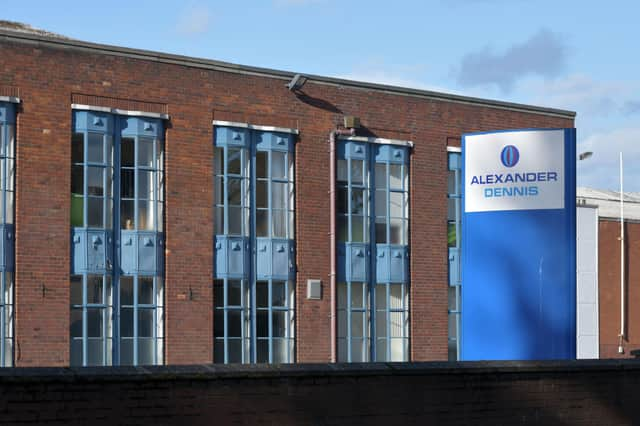Don’t let Covid damage this Scottish manufacturing success story – Pat Rafferty


By the time this article is published, the future will have become clearer but not improved for workers at Alexander Dennis Ltd, a world-class manufacturer headquartered here in Scotland with sites across the UK. In July their parent company, North American bus builder New Flyer Industries (NFI), announced up to 650 redundancies across their UK workforce of 2,300. This left workers, families and communities including Falkirk, Scarborough and Guildford with the Covid-sword of Damocles hanging over them, waiting to see where these cuts will fall.
Alexander Dennis is a Scottish and UK success story. A global player in the manufacture of bus and coach with recognised expertise in double-deckers. To put it simply, they lead the field. Prior to Covid-19, the company and its skilled workforce were looking forward to a positive future. The company had record orders on the books and with governments and businesses taking action to reverse the threat of climate change through investment in cleaner and greener mass public transport, they were facing the future with confidence.
Advertisement
Hide AdAdvertisement
Hide AdAlexander Dennis is unionised so workers have a voice in the decisions taken in their workplace and by standing together they have ensured that they are respected. Collective agreements mean decisions are taken with involvement of the workforce. It is an effective example of the ‘Fair Work Principles’ the Scottish Government is encouraging businesses to promote.
The workforce has faced hard times in the past such as a three-day week in the aftermath of the global financial crash in 2010. The workforce is facing adversity again but there are immediate solutions. The UK Government has promised funding for 4,000 low-emission buses through a £3 billion fund. This money must be made available now. In Scotland, the government must act on the recommendations of the Just Transition Commission by rapidly rolling out £500 million for green transport. This investment would include a nationwide bus scrappage scheme and the purchase of a fleet of electric buses for Cop 26, the UN Climate Change Conference, to be hosted in Glasgow in 2021. We are also faced with a fragmented and disrupted bus network. Presently local authorities and the Scottish Parliament are debating a Transport Bill which would enable municipal and public ownership of bus routes with local authorities such as Aberdeen and Glasgow investigating how they could make a bid to buy bus operations.
In Scotland, transport has regularly accounted for a large part of emissions. The sector accounts for around 37 per cent of all carbon emissions. Forty per cent of this total is generated by cars whereas bus and coach total only 3.2 per cent of all transport emissions. The need for a green mass transport revolution is clear. We need to re-balance the economy through cleaner and greener transport with Alexander Dennis primed to deliver this objective.
We don’t have to look far to see an example of what can be achieved. Fare-free buses operate in the French channel port of Dunkirk, a city of 200,000 people.
There, free bus travel has proved an overwhelming success, with a 50 per cent increase in passenger numbers overall and almost 85 per cent on some routes. Bus routes and bus fleets have been extended and include green buses run on natural gas. Whereas in Scotland, according to Transport Scotland, there were an estimated 388 million bus journeys made in Scotland in 2017/18 compared with 487 million in 2007/08. A drop of nearly 100 million over the past decade. This trend must be reversed through a number of strategic interventions as this article identifies and, in doing so, it can support highly skilled manufacturing jobs in Scotland.
However, Alexander Dennis’ parent company NFI also has a responsibility to their skilled workforce. The company must show loyalty to thousands of workers who make ADL a global success. Buses are not just built in the boardroom. NFI’s recent quarter two results for 2020 raise questions over their motivations. It is clear that decisions are being made not just as a result of the current short-term difficulties that Covid-19 has brought to the industry, but as part of a group-wide cost-cutting programme with cuts of over £15 million announced to their manufacturing base.
This cost-cutting will have a devastating impact on our members and on ADL’s UK manufacturing operations. Unite believes this approach is unjustified and will be detrimental to NFI’s long-term success.
Unite will continue to fight for these skilled jobs and the families and communities they support. Government support at this crucial time will obviously be welcomed but it must come with assurances from NFI that skilled UK jobs will be protected. We have a clear message for NFI and for both the Scottish and UK Governments: “Don’t throw our members under the bus.”
Pat Rafferty is Unite’s Scottish secretary
A message from the Editor:
Advertisement
Hide AdAdvertisement
Hide AdThank you for reading this article on our website. While I have your attention, I also have an important request to make of you.
With the coronavirus lockdown having a major impact on many of our advertisers - and consequently the revenue we receive - we are more reliant than ever on you taking out a digital subscription.
Subscribe to scotsman.com and enjoy unlimited access to Scottish news and information online and on our app. With a digital subscription, you can read more than 5 articles, see fewer ads, enjoy faster load times, and get access to exclusive newsletters and content. Visit www.scotsman.com/subscriptions now to sign up.
Our journalism costs money and we rely on advertising, print and digital revenues to help to support them. By supporting us, we are able to support you in providing trusted, fact-checked content for this website.
Joy Yates
Editorial Director
Comments
Want to join the conversation? Please or to comment on this article.